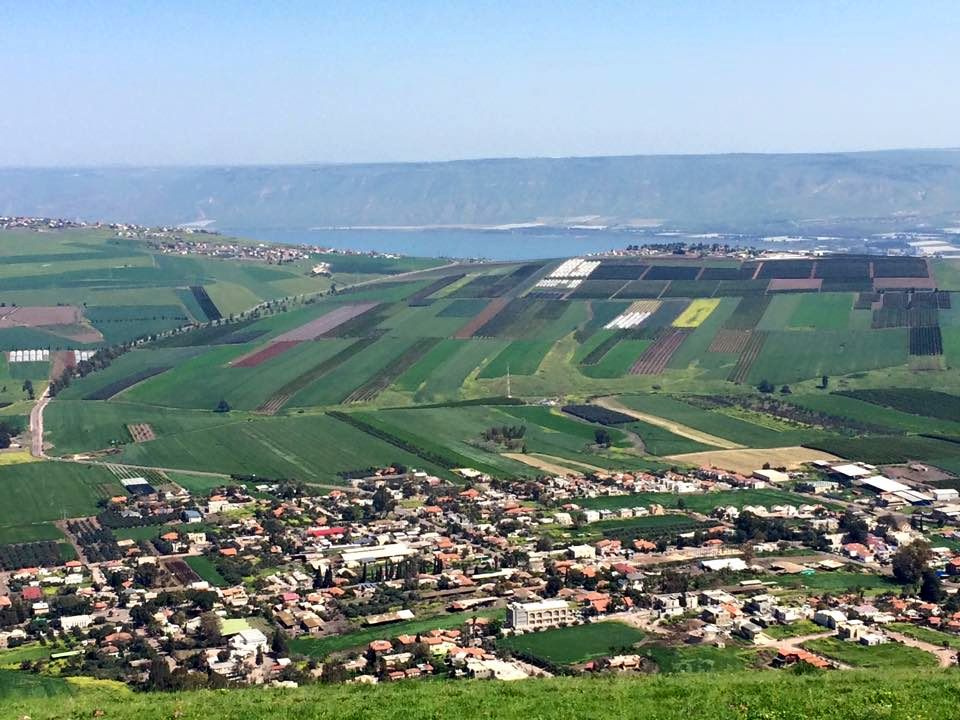Of course, to me this is no proof at all. I like to liken the brain to a radio receiver, and the soul to the radio announcer. If your radio set falls and gets broken, there might be problems in hearing radio programs. Does that mean that the man who broadcasts the radio program is damaged too? If you can't hear him well because the radio is broken - does it mean that he is not there, or that there is something wrong with him? And if the radio set is ruined completely, does it mean that the radio announcer no longer exists? Nope. But sadly, I know personally very successful scientists who truly believe that the body, the brain (the radio set) is all that there is, and that when the body dies, that's the end of everything. Of course, gladly, I know researchers and scientists who don't think so.
A couple of weeks ago I had an experience that made me think again about this topic. It was on a Shabbat. I was visiting a very sick lady, who has diabetes (horrible disease - do everything in your power to preserve your health and not to develop this disease!) and other horrible problems. One of her legs is amputated, and she suffers pains of all kinds. One of the pains she suffers from is called "phantom pain" (neuropathic pain). The leg that is no longer there - hurts her, but there is nothing she can do about it, because there is no leg, it is all in her brain! I've visited her a few times, and one of the times I saw how, just before the pain started, the stem of her amputated leg was shaking uncontrollably, and then she would scream in pain - pain in the phantom leg, the leg that is no longer there. It was very hard for me to see this - to see her pain and suffering, to see her helplessness, to see how her body (she's a beautiful woman, even in her older age) is not whole. The first time I saw this, I felt a wave of nausea, the world started turning around me, and I thought I was going to faint. Gladly, I managed to stabilize myself by breathing, sitting, etc. The next time I visited her, I felt like this again - a feeling that my mind (and body!) cannot contain this. And then the next time that I visited her, this feeling was very strong. She had tubes connected to her arm, and she was scratching, and her arm was wounded because of the scratches. She couldn't hear much, but she talked. She told me things that were very personal and deep, lamenting the fact that her life as she knew it was basically over, that just five years earlier she was young and beautiful (she still is beautiful, but I don't think it matters to her now), that her life is in shambles, etc. I sang to her some Shabbat songs, some Jerusalem songs - very soothing songs - she could hear the singing, which was strange, because she couldn't hear the talking. She was so grateful to be sang to. She said she feels as if an angel is singing to her. And then, the familiar feeling came back. It started with the world getting dark in front of my eyes, and a feeling of nausea swelling up within me, a huge wave of heat that I wasn't familiar with washed all over me and I was sweating like I never do. I tried to breath, to stabilize myself, to take my mind off her pain to other places, but I couldn't. I felt a huge wave of heat in my chest, and I felt that LITERALLY my soul was trying to leave my body. I felt a huge pressure in my chest, and it was very painful, and it truly felt as if my soul was trying HARD to get out of my body, to leave, to escape that painful scene. My body resisted, I felt the battle between body and soul, as if the soul says: 'let me go!', and the body says: 'not now, not yet!'. That was such a strange feeling. My body was so strong in resisting! I've never ever felt the separate existence of body and soul in such a tangible way. Never. The body won - I'm still here to write about it, but truthfully, I think it ended with a temporary compromise. Because a few moments later, I opened my eyes and found myself on the floor, three nurses looking at me with worried looks and kind, soft smiles. 'What happened?', they asked. 'Were you hurt?'. When I realized that I fainted, I was quick to try to get up on my feet again and to brush this off as nothing. I told them that everything is OK, that I just feel weak. They didn't let me get up. They insisted that I sit and recover completely, and gave me water. When they realized that what caused the fainting was my reaction to the pain of the woman in the bed, they escorted me out of the room. One of the nurses told me that she saw me as it was happening and rushed to me, and therefore managed to catch me in time, to catch my head, before I hit the floor. I was so grateful. Another nurse, an Arab man, asked me again and again: Are you sure nothing hurts? You weren't hit by the floor? Nothing was hurting, thank G-d. They took me out to sit on a chair outside of her room, but I could still hear her cries of anguish from there as well, and a wave of tears welled up inside of me and - how embarrassing - washed my face. I was sitting there, drinking the water that they gave me, hiding my face with my arm, and crying quietly, trying hard to let no one notice. The wave of emotions was so powerful, I just couldn't contain it. After some ten minutes, I was back to myself. I went back to the room (with the Arab nurse with me this time), and said goodbye to the woman. She made an unhappy face, because the visit was too short. I really want to visit her, but I don't think it's a good idea, since every time I see her I feel like I'm going to lose consciousness. I'm thinking that perhaps I can go for only ten minutes or so, and when I feel that I'm going to faint, I can leave immediately, and not try to stabilize myself. Anyway, this whole episode demonstrated to me even more tangibly than ever before - that body and soul are not the same entity, and that the soul, most probably, resides in the heart - in the chest area - and not in the brain, as I felt it trying to leave from the chest area.
It reminds me of something that I heard a few years ago from Yossi Sarid (a super leftist Israeli politician, very secular, an intellectual, who - despite his political opinions - was a good man). He died a few years ago, but years before he died, he experienced clinical death, and told about it in the radio as a by the way story, even though he knew that it might risk his reputation as a rational man. It started with the same experience I had - a huge pressure and heat wave in the chest area, a feeling that the soul wants to leave, but in his case - it managed to leave the body! He died a clinical death, but his soul was present there, hovering above the scene, and saw everything that was happening from above. It happened to him in a car, when his wife was driving and the kids were in the back. They all panicked and started crying. He saw the medical team at the hospital taking care of his body, etc. And he started to feel how his soul is leaving this world - this world started looking very small - until he was so high - and then the doctors managed to bring him back. To hear something like this from a super secular, lefty, rational person - is something to remember. And he is known as a very very honest person. No corruption was ever found with him, which is rare in politics. And he had nothing to gain from telling this story - he could only lose: his reputation, his respect in the eyes of people, his electoral power, etc. So I believe him. Anyway, experiencing what I had experienced during my last visit to the hospital, I got yet another evidence that it was true.
This week's Portion, Devarim, starts a whole new book in the Torah: the fifth book of Moses. This whole book is a goodbye speech that Moses give the People of Israel, shortly before they enter the Holy Land. In this very long, powerful speech, Moses reminds the people of the things that happened in their journey in the desert - the good, and the bad. His purpose is to remind the people not of the events themselves, but rather the moral lesson to be gleaned from them. Moses will not be with the Israelites when they enter the Land of Israel. They will not have them to rebuke them and bring them back to the right way, to the good way, and he tries his best to teach them - to be good even when he is not around them. It is a little bit like a father with children. The father's goal is to make sure that his children behave well not only when he is around, but especially when he is not around.
The Prophet Portion (Haftorah) that we read this week is from Isaiah 1: 1-27, in which the prophet Isaiah rebukes the nation for not behaving according to the values of the Torah. But even within this text, G-d says a few very hopeful, beautiful words: "Wash you, make you clean, put away the evil of your doings from before Mine eyes, cease to do evil; Learn to do well; seek justice, relieve the oppressed, judge the fatherless, plead for the widow. Come now, and let us reason together, saith the LORD; though your sins be as scarlet, they shall be as white as snow; though they be red like crimson, they shall be as wool. If ye be willing and obedient, ye shall eat the good of the land; But if ye refuse and rebel, ye shall be devoured with the sword; for the mouth of the LORD hath spoken." In these few words, as well as in many other places in the Bible, G-d gives us a free choice - to choose between good and evil, and promises reward for those who choose good. Even more important than this, He gives us the ability to REPENT - not only to say we are sorry for our bad deeds, but to actually change our ways and be better - and then He promises to forgive us. No need for blood, no need for sacrifices ("To what purpose is the multitude of your sacrifices unto Me? saith the LORD; I am full of the burnt-offerings of rams, and the fat of fed beasts; and I delight not in the blood of bullocks, or of lambs, or of he-goats.") In order to be forgiven we don't need blood to atone for us - we only have to purify ourselves and change our ways for the better, and He will forgive us.
Shabbat shalom!










